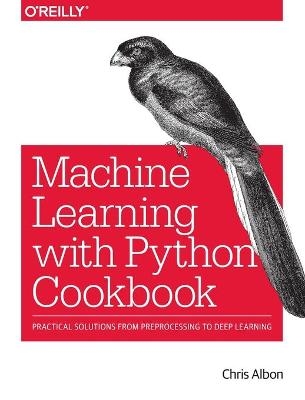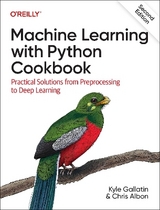
Machine Learning with Python Cookbook
Practical Solutions from Preprocessing to Deep Learning
Seiten
2018
O'Reilly Media (Verlag)
978-1-4919-8938-8 (ISBN)
O'Reilly Media (Verlag)
978-1-4919-8938-8 (ISBN)
- Titel ist leider vergriffen;
keine Neuauflage - Artikel merken
Zu diesem Artikel existiert eine Nachauflage
This practical guide provides nearly 200 self-contained recipes to help you solve machine learning challenges you may encounter in your daily work. If you're comfortable with Python and its libraries, including pandas and scikit-learn, you'll be able to address specific problems such as loading data, handling text or numerical data, model selection, and dimensionality reduction and many other topics.
Each recipe includes code that you can copy and paste into a toy dataset to ensure that it actually works. From there, you can insert, combine, or adapt the code to help construct your application. Recipes also include a discussion that explains the solution and provides meaningful context. This cookbook takes you beyond theory and concepts by providing the nuts and bolts you need to construct working machine learning applications.
You'll find recipes for:
Vectors, matrices, and arrays
Handling numerical and categorical data, text, images, and dates and times
Dimensionality reduction using feature extraction or feature selection
Model evaluation and selection
Linear and logical regression, trees and forests, and k-nearest neighbors
Support vector machines (SVM), naive Bayes, clustering, and neural networks
Saving and loading trained models
Each recipe includes code that you can copy and paste into a toy dataset to ensure that it actually works. From there, you can insert, combine, or adapt the code to help construct your application. Recipes also include a discussion that explains the solution and provides meaningful context. This cookbook takes you beyond theory and concepts by providing the nuts and bolts you need to construct working machine learning applications.
You'll find recipes for:
Vectors, matrices, and arrays
Handling numerical and categorical data, text, images, and dates and times
Dimensionality reduction using feature extraction or feature selection
Model evaluation and selection
Linear and logical regression, trees and forests, and k-nearest neighbors
Support vector machines (SVM), naive Bayes, clustering, and neural networks
Saving and loading trained models
Chris Albon is data scientist with a Ph.D. in quantitative political science and a decade of experience working in statistical learning, artificial intelligence, and software engineering. He founded New Knowledge, an artificial intelligence company, and previously worked for the crisis and humanitarian non-profit, Ushahidi. Chris also founded and co-hosts of the data science podcast, Partially Derivative.
| Erscheinungsdatum | 06.04.2018 |
|---|---|
| Verlagsort | Sebastopol |
| Sprache | englisch |
| Maße | 181 x 233 mm |
| Gewicht | 652 g |
| Einbandart | kartoniert |
| Themenwelt | Schulbuch / Wörterbuch ► Lexikon / Chroniken |
| Informatik ► Datenbanken ► Data Warehouse / Data Mining | |
| Informatik ► Grafik / Design ► Digitale Bildverarbeitung | |
| Informatik ► Programmiersprachen / -werkzeuge ► Python | |
| Informatik ► Software Entwicklung ► User Interfaces (HCI) | |
| Informatik ► Theorie / Studium ► Algorithmen | |
| Informatik ► Theorie / Studium ► Künstliche Intelligenz / Robotik | |
| ISBN-10 | 1-4919-8938-6 / 1491989386 |
| ISBN-13 | 978-1-4919-8938-8 / 9781491989388 |
| Zustand | Neuware |
| Informationen gemäß Produktsicherheitsverordnung (GPSR) | |
| Haben Sie eine Frage zum Produkt? |
Mehr entdecken
aus dem Bereich
aus dem Bereich
Schulbuch Klassen 7/8 (G9)
Buch | Hardcover (2015)
Klett (Verlag)
CHF 29,90
Buch | Softcover (2004)
Cornelsen Verlag
CHF 23,90



